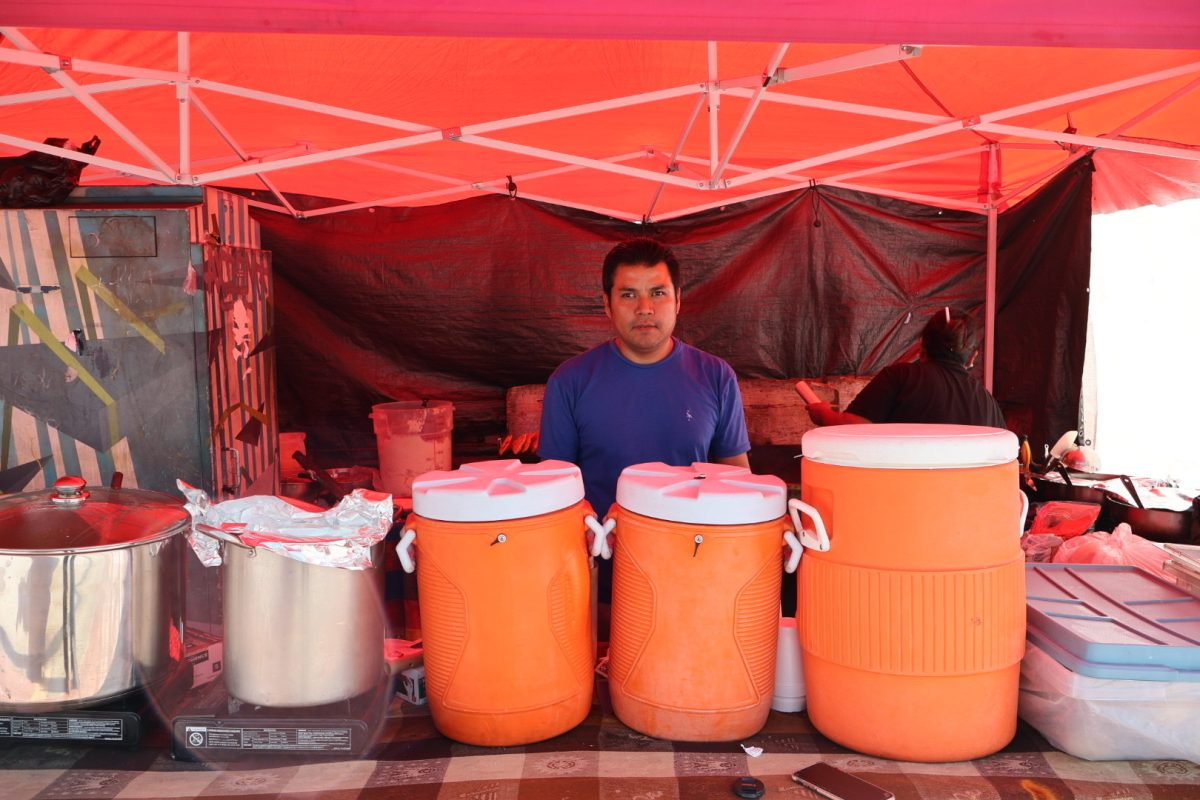The North Hollywood Station sees hundreds of people everyday. Students, workers and community members alike make their way in and out of the station as they commute to their respective places each day.
The train ride may not be the most attractive or exciting part of the journey, but it’s sure to bring you closer to a corner. A corner that has become a welcoming place for passing strangers.
As you make your way up and out the three long sets of stairs, you are greeted by the sweet smell of atole and arepas.
Arepas are freshly handmade cornmeal cakes stuffed with grilled cheese, beans and meat. Arepas are a South American staple known for their popularity amongst the Latino community. Atole, a traditional Mexican hot beverage, made with corn flour, brown sugar cane, cinnamon and vanilla is perfect during the winter season especially around the holidays.
This corner, however, greets you with these Mexican dishes all year round.
Guillermo Martinez and Teodora Villalobos are two street vendors who have offered their services for years on North Hollywood Station between the Orange Line and the Red Line in the corner of Lankershim Boulevard and Chandler Boulevard.
Martinez along with his female coworker began selling at this corner just three years ago. Having worked in restaurants for the majority of their lives, they decided to start their very own business in what they considered to be a very transited and representative area of the working class.
Martínez’s stand, located to the right of the station’s escalators, offers a wide variety of Latin American cuisine ranging from arepas, empanadas, atole and avena. His stand, containing only a large grill and a couple of pots and pans, emulates that of a restaurant kitchen, whose purpose is the same – to serve each and every hungry customer.
Having placed a couple of tables and chairs at his stand, Martinez aimed to provide his customers a space to sit and enjoy the food as well as share a moment of tranquility in the midst of the chaos of a long day.
Although his clientele has been nothing short of kind and supportive, it is the city and its regulations that pose a threat to his business and livelihood.
“They still don’t have permits for food. I would like there to be a permit so I could work more calmly… They give everyone here a ticket,” states Martinez.
Few laws and regulations have expanded the rights of street vendors. Hence, an inclusive and meticulous agreement advocating for the street vendor community is still far away.
Senate Bill 972 went into effect on Jan. 1, 2023 decriminalized sidewalk street vending and limited the cities’ enforcement. Street vendors no longer receive infraction offenses or misdemeanors, but are still subject to non-criminal administrative citations. Hence, there are a number of limitations that continue to obstruct the overall success of street vendors.
Under SB 972, sidewalk food vendors are now known as compact mobile food operations or CMFOs. This includes push carts, stands, pedal-carts and wagons but strictly prohibits “temporary restaurants.” Typically positioned under an overhead canopy, these “temporary restaurants” lack the formality of an actual restaurant and concurrently lack the proper refrigeration and health permits that other CMFOs possess, resulting in yet another limitation for the street vending community.
Failure to show proof of the required health permit signifying the street vendor has complied with the health codes as mandated by the California Retail Food Code is now penalized through the issuing of an administrative fine.
According to the Enacted Safe Sidewalk Vending Act, “an administrative fine not exceeding $250 for a first violation. (ii) An administrative fine not exceeding $500 for a second violation within one year of the first violation. (iii) An administrative fine not exceeding $1,000 for each additional violation within one year of the first violation.”
Despite all the new regulations in place, these fines continue to pose an immediate threat for street vendors that are unable to comply with both the cities’ and health code ordinance. They continue to ignore the citations and are continuously fined in the desperate need to sustain themselves and their families.
Teodora Villalobos, whose “temporary restaurant” has fought against adversity for 13 long years, is a prime example of everything that is wrong with the system and what this humble corner has to offer.
Teodora Villalobos poses in front of her stand in North Hollywood Station on October 2023 by Nancy Cruz
Villalobos, a single mother with this as her sole source of income, shares the helplessness that exists in wanting to simply do your job and constantly being harassed and belittled by your own city rather than supported.
Villalobos left her original spot on the corner of Santa Monica and Vermont, after L.A. Country Public Health officials threw all of her food merchandise away. Villalobos got reestablished in the corner of North Hollywood Station along with other vendors and their “temporary restaurants.”
Villalobos, who has received various warnings by city officials over the years, began attending community meetings to better understand her options and rights as a street vendor. She has long urged the city for a permit that includes “temporary restaurants” in their agenda and while she’s been told the city is working on it, nothing has ever come out of it.
“For them to give us a permit to be able to work legally and without worry. That’s what we want, to be happy working and not have anyone bother us,” states Villalobos. “But like this, we are always thinking that the city will come soon.”
For years street vendors have asked for one thing and one thing only – to be able to work in peace. Peace from the continuous harassment of city officials. Peace from the outrageous fines and insurmountable requirements whose purpose is to destroy the very same peace they yearn for.
The peace to do the work they love and look forward to, in spite of it all.
“I love my job, my cooking. When they tell me, ‘oh how delicious your food is’ I love that,” states Villalobos “That’s what motivates me the most. That is all. I feel happy.”
There are an estimated 10,000 street vendors in the city of Los Angeles and only 165 have been issued permits according to an August 2021 report by UCLA.
It is absolutely unacceptable that such an integral and crucial part of the community is so often ignored when they are living testimony to the Angeleno culture. In the face of it all, something has to be done.
Guillermo Martinez and Teodora Villalobos have created a sense of community in a corner that otherwise bleak and boring, continues to be a symbol of unity in a rather divisive world.






